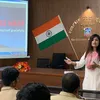Students of Telangana government school make organic ‘zero-waste’ sanitary pads
The ‘Stree Raksha Pads,’ created by the students of Zilla Parishad High School (ZPHS), Mulkalapally, are made with organic substances that can easily decompose.
Menstrual hygiene and care have been debatable for a long time in India. While Indian women are still fighting the taboo around periods and the unavailability of affordable sanitary napkins, there is a growing concern around the pollution these discarded napkins cause.
This is primarily because of the plastics used to make these sanitary pads that do not decompose easily.
To solve this issue, students of a government school in Yadadri Bhuvanagiri district in Telangana have come up with the idea of ‘zero-waste’ sanitary napkins.
The students of the Zilla Parishad High School (ZPHS), Mulkalapally, won the first prize in the Telangana School Innovation Challenge for their organic, zero-waste ‘Stree Raksha (menstrual) Pads,’ made of hyacinth leaves, stocks, fenugreek seeds, subja or basil seeds, turmeric, neem leaves, and cotton.
Speaking on the innovation, Swathi, a student of ZPHS, Mulkalapally, told ANI, “To find a solution to the prevailing sanitary waste issue, we have created sanitary pads from organic materials. The sanitary pads that are currently being used by many are made from petroleum chemicals, which have many side effects, and take many years to decompose, leading to many environmental issues.”
“After researching that water hyacinth has a lot of ayurvedic essence in it, and the way it has been used by many women by warping it in a cloth along with cow dung as sanitary pads during ancient times, we have decided to create more contemporary sanitary pads,” she added.
The pads are made by creating a paste of water hyacinth mixed with neem leaves, fenugreek seeds, and turmeric, and are dried till it becomes a solid board. It is then cut into sanitary pads of a standard size. Fenugreek and sabja seeds are added to this board with beeswax glue. The board is then placed between two cotton strips and sealed.
Kalyani, the teacher who mentored these students to create the sanitary napkins, said, “The girls who live in village areas cannot afford the contemporary sanitary pads as they are costly, and many still stick to the ancient methods.”
She added, “Moreover, the sanitary pads available in the market may have side effects and sometimes lead to serious complications. Therefore, the students have come up with this idea to create an organic sanitary pad named ‘Stree Raksha Pads.’ I am proud of them.”
Do you have an interesting story to share? Please write to us at [email protected]. To stay updated with more positive news, please connect with us on Facebook and Twitter.
Edited by Suman Singh







